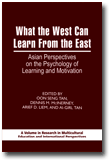
What the West Can Learn From the East
Asian Perspectives on the Psychology of Learning and Motivation
Edited by:
Oon Seng Tan, National Institute of Education, Nanyang Technological University Singapore
Dennis M. McInerney, The Education University of Hong Kong
Gregory Arief D. Liem, University of Sydney
Ai-Girl Tan, National Institute of Education, Nanyang Technological University Singapore
A volume in the series: Research in Multicultural Education and International Perspectives. Editor(s): Fred Dervin, University of Helsinki, Finland. Zehavit Gross, Bar Ilan University.
Published 2008
Education, East and West, is today mostly Western in orientation. Asian perspectives remain relatively unrepresented in curricula, pedagogy and administrative structures. This volume has brought together authors researching in Asia who redress this imbalance and describe what the West can learn from the East. Topics covered include conceptions of and approaches to effective learning and teaching, self-regulated learning, perceived causes of success and failure, valuing of education, peer influences and classroom behavior, creativity, teacher commitment, class size, motivation, future goals, and other influences on effective learning. Shared insights from the research and theorizing presented should provide a fascinating perspectives for educators and administrators charged with providing cutting-edge, research-based educational best practices in diverse cultural and social environments internationally.
CONTENTS
West-East and East-West Learning: Some Psychological and Cultural Insights, Oon Seng Tan, Dennis M. McInerney, Arief D. Liem, and
Ai-Girl Tan. Teaching Creativity as a Demand-Led Competency, Elena L. Grigorenko and Mei Tan. Western Influences on the East, Eastern Influences
on the West: Lessons for the East and West, Julian G. Elliott and Nguyen Phuong-Mai. Western Educational Research: A Basic for Educational
Reforms in Asia? David A. Watkins. Ability Versus Effort: Perceptions of Students From the East and from the West, Alexander S. Yeung and Anton
Yeung. Cross-Cultural Views of Teacher Commitment in Malaysia: Their Nature and Their Effects, Nordin Abd Razak, I Gusti Ngurah Darmawan, and
John P. Keeves. In the Students' Own Words: Etic and Emic Conceptual Analyses of Why and How Students Learn, Arief D. Liem, Elizabeth Nair,
Allan B. I. Bernardo, and Paulus H. Prasetya. Filipino Adolescent Students’ Conceptions of Learning Goals, Allan B. I. Bernardo, Maria Guadalupe
C. Salanga, and Karla Marie C. Aguas. Motivational and Self-Goals of Female Students in Contemporary Japan, Dexter Da Silva and Dennis M.
McInerney. Motivation, Attribution of Academic Experiences, and Achievement Among Arab Students
Within a Sociocultural Context, Maher M. Abu-Hilal. Cross-Cultural Validation of Self-Regulated
Learning in Singapore, Jerome I. Rotgans and Henk G. Schmidt. Future Goals and Self-Regulated
Learning Among Singaporean Chinese Students: The Mediating Role of the Utility Values of Schooling,
Academic Self-Concept, and Academic Motivation, Dennis M. McInerney, Arief D. Liem, Yasmin
P. Y. Ortiga, Jie Qi Lee, and Adelaine. S. Manzano. Role of Fieldwork in Humanities and Social Studies
Education, Chew Hung Chang and Giok Ling Ooi.
-
Paperback978-1-59311-987-4
Web price: $45.04 (Reg. 52.99)
-
Hardcover978-1-59311-988-1
Web price: $80.74 (Reg. 94.99)
- eBook9781607529989

-
 Culture, Motivation and Learning
A Multicultural Perspective
Culture, Motivation and Learning
A Multicultural Perspective
-
 Democracy and Multicultural Education
Democracy and Multicultural Education
-
 From Sites of Occupation to Symbols of Multiculturalism
Re-Conceptualizing Minority Education in Post-Soviet Latvia
From Sites of Occupation to Symbols of Multiculturalism
Re-Conceptualizing Minority Education in Post-Soviet Latvia
-
 Growing Up Between Two Cultures
Issues and problems of Muslim children
Growing Up Between Two Cultures
Issues and problems of Muslim children
-
 Indigenous Postgraduate Education
Intercultural Perspectives
Indigenous Postgraduate Education
Intercultural Perspectives
-
 Religion in Multicultural Education
Religion in Multicultural Education
-
 Silent Partners in Multicultural Education
Silent Partners in Multicultural Education

